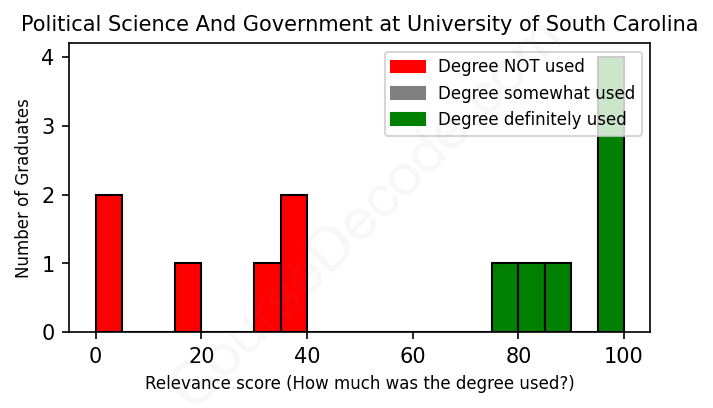
First, some facts. Of the Political Science And Government graduates from University of South Carolina we've analyzed , here's how many have used (or NOT used) their degree in their career:

These are estimates based on AI analysis of 13 LinkedIn profiles (see below).
The verdict? Below average. Overall, with an average relevance score of 58%, Political Science And Government graduates from University of South Carolina have a lower likelihood (-9%) of finding work in this field compared to the average graduate across all fields:
And for comparison, here's the chart for all profiles we've looked at across all degrees.
Also, after graduating, only 23% of these graduates have pursued further education other than another Bachelor's degree (such as a Masters degree or other), compared to the average across all profiles of 35%. This suggests a Bachelors degree is enough for most Political Science And Government graduates, and it's normal to look for work straight after graduation.
See the details:
|
Relevance score: 100% We think this person has gone into a career highly relevant to their degree. We think this person has gone into a career highly relevant to their degree.
DEGREE INFOGraduated in 2020 from University of South Carolina with a Bachelors in Political Science And Government. No other secondary education since. JOB HISTORY SINCE GRADUATIONSpecial Assistant U.S. House of Representatives Jan 2021 - Mar 2022 Political Coordinator  Republican Governors Association Mar 2022 - Dec 2022 Staff Assistant  United States Senate Jan 2023 - Jan 2024 Legislative Correspondent  United States Senate Jan 2024 - Present ABOUTNo information provided. |
The top 10 most common jobs done by the graduates we've analyzed (ranked most common to least) are:
When looking at the job experiences of graduates from the University of South Carolina who studied Political Science and Government, there seems to be a clear trend. Many graduates have taken positions that are closely tied to the political realm, especially roles in governmental organizations, political parties, and advocacy groups. For example, roles like Proctor in the US Senate Page Program, Executive Assistant at the United States Senate, and various positions within political committees illustrate a strong connection to their academic background. Positions like these use the skills and knowledge gained from their degree daily, directly engaging with government processes and contributing to political discourse.
On the other hand, there are also graduates who have ventured into jobs that seem pretty unrelated to their studies. Many found themselves in sales, customer service, or operational roles, which don’t fully tap into the principles of political science. While some roles, like being a summer camp clerk or a mortgage consultant, offer transferable skills, they lack direct relevance to political science and government principles. Overall, while a good number of Political Science graduates find themselves in related fields, it’s clear that not all take paths that align closely with their academic training, indicating a mixed bag of job relevance among this group. It's a reminder that your degree can open many doors, but not every job will use all the skills you learned in school.
Here is a visual representation of the most common words in job titles for Political Science And Government graduates (this is across all Political Science And Government graduates we've analyzed, not just those who went to University of South Carolina):

When you look at the career paths of graduates from the University of South Carolina with degrees in Political Science and Government, you’ll notice some interesting trends. Many of these graduates tend to stay close to politics and public service for their first jobs. Right out of college, roles like Congressional Internships, Executive Assistants within government offices, and organizing positions in political parties are quite common. For example, graduates from 2013 have jumped straight into jobs on Capitol Hill, showing that there’s a solid entryway for them into political careers early on. However, not everyone follows that political track; some end up in quite different fields – like sales or social media management – while others venture into nonprofit work or law. So, it's a mixed bag right after graduation.
If we look five to ten years out, many grads who started in political roles continue to climb the ladder, finding their way into higher positions like Policy Analysts, Regional Field Directors, or even becoming Legal Associates. Meanwhile, those who took different paths often find success in corporate sectors or nonprofits, though they might stray further from their Political Science roots. It’s worth noting that not every graduate sticks to political careers; some take various opportunities that may not directly relate to their degree. In summary, while many graduates do find meaningful work relevant to their studies, others veer off into various other fields, leading to a mix of experiences in the job market over time.
Hey there! So, when it comes to a Bachelor’s degree in Political Science and Government, it’s pretty much on par with average college degrees in terms of difficulty. At the University of South Carolina, you’ll dive into a lot of reading, writing, and critical thinking—think of it as a mix of debates, research papers, and some theories that can get pretty complex. Some people find it easier because they enjoy discussing politics and current events, while others might struggle with the heavy course load and the need to really engage with the material. Overall, it can be manageable if you stay organized and passionate about the subject!
Most commonly, in the LinkedIn profiles we've looked at, it takes people 4 years to finish a Bachelor degree in Political Science And Government.
From what I can see, the graduates from the University of South Carolina have had a mix of jobs, with some clearly earning more than others. Those who ended up in roles like Executive Assistant at the U.S. Senate or working as law associates seem to be doing pretty well in terms of salary, which is great because those positions typically offer decent pay. On the flip side, some folks are starting out in lower-paying positions, like internships and entry-level roles at nonprofits and other organizations, which might not stack up financially at first. Overall, it looks like there's potential for good earnings, especially for those who progress into more advanced roles in their fields, but a lot of it depends on the exact job and area of focus. So, while some are likely making decent money, others might still be working their way up the ladder.
Here is a visual representation of the most common words seen in the "about" section of LinkedIn profiles who have a Bachelor degree in Political Science And Government (this is across all Political Science And Government graduates we've analyzed, not just those who went to University of South Carolina). This may or may not be useful:

Here are all colleges offering a Bachelor degree in Political Science And Government (ordered by the average relevance score of their Political Science And Government graduates, best to worst) where we have analyzed at least 10 of their graduates: